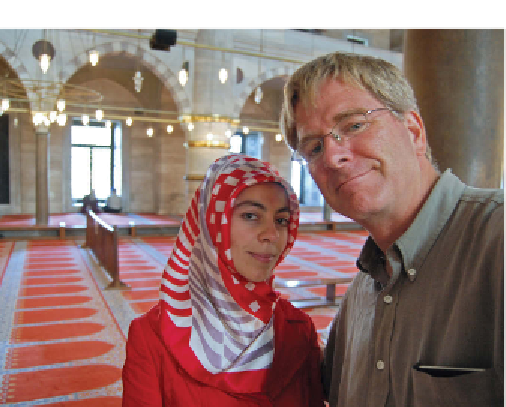Travel Reference
In-Depth Information
tive religious statement.
It took some convincing
before she obliged. She
tied the scarf under her
chin and around her face,
and then, with an extra
fold across the forehead,
suddenly she became
orthodox. The power
of that last fold gave me
goose bumps. She took it
of with a shudder.
Later that day, I
dropped by Istanbul's
Eyüp Sultan Mosque, where all women wore their scarves with that fore-
head fold. Famous in Istanbul as the mosque attracting the most conservative
worshippers, even its state-employed female security guards were wearing
strict, religious headscarves. To my secular Turkish friend, it was striking—
even ominous—that state employees would be seen in this garb.
h e courtyard outside the mosque was i lled with a kind of religious
trade fair. Stalls of ering free food, literature, and computer programs (with
a Mavis Beacon-type prayer guide) stood side by side. Using incentives to
target poor and less-educated Turks, it reminded me of the old-school strat-
egy of Christian missionaries. h e propaganda seemed mostly directed at
women. My friend believes that women, even more than men, are pulling
secular Muslim societies like Turkey to the right.
h e mosque was i lled to capacity, and the courtyard was jammed with
the overl ow crowd. Women knelt to pray next to their men. But my Turk-
ish friend predicted that in two years, the sexes would be segregated. She
pointed to a stairway already i lled with fundamentalist women who believed
they should worship separately. h
ey've staked out this zone until a formal
women's area can be established.
Marketers know that women make the purchasing decisions in Ameri-
can families. Considering this, I ponder whether women make the religious
decisions in Turkish families, and to what degree women really are behind
the changes in moderate Muslim societies like Turkey. I consider the impact
women have on the political discourse in my country. It's interesting that,














































































